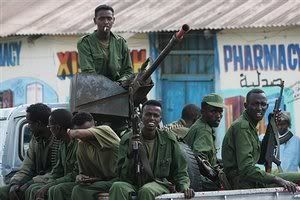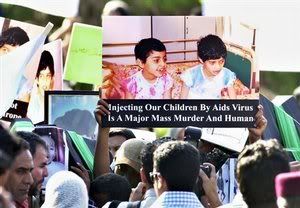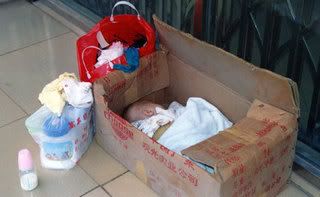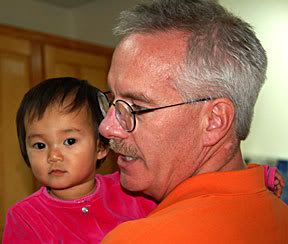Guatemala has the highest rate of malnourished children in the Western Hemisphere, and the government is struggling to reduce the deaths.By NANCY SAN MARTIN
nsanmartin@MiamiHerald.com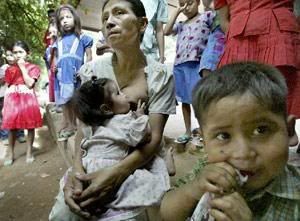
JOCOTAN, Guatemala -- Three-year-old Antonio's patchy skin is thin and saggy, like that of a shrunken old man. But his cries sound more like a newborn's whine. And although his head seems much too large for his frail body, it's actually his body that is too small.
Plopped on a wheelchair because he's too weak to walk, Antonio's crystal black eyes tend to wander until the smell of food penetrates the air and steaming bowls of beans pass before him. Then his mouth starts to salivate and he lets out a desperate whimper.
But Antonio must wait until 10 other hungry children are set up with their meals. Only then can the nurse at the health center focus her attention on feeding the boy who doesn't have the muscle coordination to feed himself.
Weighing about 18 pounds, as much as a 6-month-old baby, Antonio represents one of the worst cases of malnutrition in a country where more than one million children under 5 suffer from the condition.
''Cases such as Antonio's should no longer exist, but the problem remains constant,'' said
Dr. Carlos Arriola, director of a health center in this remote village where the boy and other malnourished children are being treated. ``Like Antonio, many others exist.''
Guatemala has the highest rate of malnourished children in the Western Hemisphere, even higher than
Haiti, the region's poorest country. The Central American nation also ranks sixth in the world for chronic malnutrition.
The problem usually begins in the womb of mothers who are anemic throughout their pregnancy and give birth to children with low birth weights. More than half of those babies don't make it beyond the age of 5.
''We have many children because we know that some of them are going to die,'' is a phrase often heard by indigenous families in Guatemala's rural communities, where the problem is most prevalent. The indigenous make up about 45 percent of the population in a nation of 13 million.
''There is no reason that this should be happening. Yet, it's been going on for years and years,'' said
Manuel Manrique, a representative for the
U.N. Children's Fund in
Guatemala. ``Part of our task is to make people aware that this is happening and that it is unacceptable.''
ADDRESSING PROBLEMTwo efforts are under way to address the problem: a national program for the reduction of malnutrition and a public awareness campaign called
Creciendo Bien or
Growing Well. The programs have international support from the
United Nations,
the U.S.-based
Save the Children and other agencies.
Launched in 2004, the goal is to reduce chronic malnutrition for children under age 5 down from the current 49.3 percent to about 25 percent by the year 2016. The initiative is aimed at two types of malnutrition: chronic and acute, which is easier to treat but more life-threatening.
Malnourished children do not grow properly. Often, they are much thinner and shorter than they ought to be for their age.
''Children here don't grow enough,''
Manrique said. ``There is a difference [in height] of 25 percent, compared to other kids in the Americas.''
''It's not just what you see outside, it also affects their brain,'' he said. ``It's a life sentence.''
Factors contributing to the widespread problem are high illiteracy and birth rates, unemployment, scarce fertile land for peasant families to grow their own crops, persistent drought and insufficient government help with cultivation. Unsanitary conditions and contaminated water raises the problem to life-threatening levels for malnourished children.
Malnutrition is most prevalent in mountain villages like
Jocotán and
Camotán in the department of
Chiquimula, east of
Guatemala City. Here, most everyone is petite, the result of years of insufficient food. Most families live in adobe homes with thatched roofs and dirt floors and depend on agricultural work. Poor harvests mean few jobs and many empty stomachs.
''There is too little food for so many mouths,'' said
Melesia Nufio, 25, the mother of a wispy 1-year-old boy. ``We live off tortillas and coffee.''
The bony-framed
Nufio, who has three other malnourished children, is among about 35 women receiving instruction on proper childcare and hygiene as part of a year-old pilot project to stop malnutrition at an early age. A cereal distribution program for children and pregnant mothers also was recently launched.
The women in the program have a combined 75 children, newborn to 6 years old. Most are underweight and several suffer from chronic malnutrition. But the program has been successful in preventing deaths in a community where dying children was common.
''We used to have a child die about every six months,'' said
Irma Yolanda Martínez, a community leader. ``Thank God, no child has died of malnutrition since the program began.''
STEADY WORK NEEDEDEven as the assistance is welcome,
Martínez said that what is really needed is steady work.
''If we give them food, they'll eat and then the food will be gone again,'' she said. ``An agricultural program would be more beneficial.''
Nufio's family knows the dire consequences of malnutrition. Her mother-in-law
Nicolasa Vásquez, has lost two of her nine children. One died at birth, the other as a toddler.
''I don't have enough food to give them all the nutrition they need,'' said
Vásquez, 45, as she cradled her youngest child, 7-month-old Jessica.
''We are used to living like this,'' said Vásquez's husband
Tereso Casiano. ``It's what God has given us.''
In
Jocotán, salvation can be found at two nutrition centers.
The public
Center for Nutritional Recuperation opened in 2001 with 70 patients and now treats more than 150 children annually who suffer from chronic malnutrition. Patients, who often display symptoms that include irritability, loss of hair and spotty skin, stay as long as two months while they are fed a ''recuperation'' diet comprised of vitamin-rich formulas and cereals.
But as hundreds of children are nursed back to health, just as many fall ill.
''It remains a constant problem,'' said
Dr. Juan Manuel Mejía. ``There is a lot of malnutrition in the countryside and this year, it seems to have grown a bit.''
Children suffering from acute malnutrition, like Antonio, often end up at the
Centro de Recuperacion Nutricional Infantil Bethania, simply known as
Centro Bethania. Many are on the verge of death by the time they are admitted. Antonio was 15 pounds underweight when he was admitted.
GETTING TREATMENTThe center treats about 400 children each year and on average eight don't survive. It takes at least a month for children to reach up to 80 percent of their ideal weight, said
Arriola, the director.
Treatment costs about $900 per child, and though parents are asked to contribute only about $40 of the cost, that is a small fortune in a nation where the distribution income is highly unequal and as much as 75 percent of the primarily indigenous rural population lives on less than $2 per day.
Arriola praised the national initiative as a good first step but added that to successfully combat malnutrition, the effort must be accompanied by ''concrete programs'' that will lower unemployment, increase crop production and improve literacy rates.
He also expressed concern that the national programs would be dropped when a new national government is elected next year.
''What happens when we get a new government?,''
Arriola said. ``Will the state continue to take on the responsibility or is this just going to be a program based on politics?''
Manrique, of
UNICEF, blamed politics for previous failed attempts to address malnutrition and criticized limited resources for health and education programs. About 1.8 percent of the GDP goes to health and about 2.9 percent to education.
''This country has a gigantic effort to take on,'' he said. ``With food and other efforts done simultaneously, in a couple of years, we can start to see significant changes.''
The primary focus of the current campaign is to create awareness among the population ''so that these programs are not thrown away once this government is finished,''
Manrique said. ``Knowledge, consciousness and food: those are the three things, properly mixed, that will make change.''


